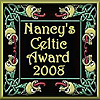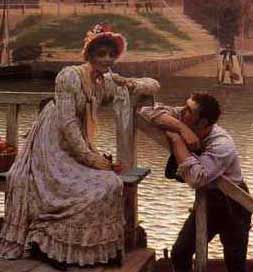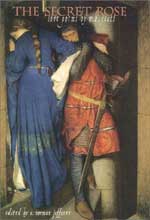| |

Traditions, folklore, history and more. If it's Irish, it's here. Or will be!
"People will not look forward to posterity who never look backward to their ancestors."
-Edmund Burke




Quotes
Library: Books, Movies, Music
Prints & Photos
Poetry
Jokes


Shops Ireland
Bunús na Gaeilge
(Basic Irish)
Circle of Prayer
Blessings
Did You Know?
Himself/Herself
Write to Us
Readers Write..
Links/Link to Us
Advertise with us
Awards & Testimonials
Submissions Guide


|
|
|
The Irish In Love - Still Waters Run Deep
by Bridget Haggerty
 In my memory, my parents weren't very demonstrative when it came to expressing their affection for each other. On the other hand, when you're a kid, you don't notice subtleties such as a twinkle in the eye, a coquetish tilt to the head, or a brief brush against an arm or shoulder when putting the tea on the table. In my memory, my parents weren't very demonstrative when it came to expressing their affection for each other. On the other hand, when you're a kid, you don't notice subtleties such as a twinkle in the eye, a coquetish tilt to the head, or a brief brush against an arm or shoulder when putting the tea on the table.
According to Edna O'Brien, "Depending on one's sex and one's religious propensities, love can be a skiff of magic power or a simple gaze on God. But not for the Irish, for whom everything is more copious, more trenchant and in the Doomsday Book, probably more consequential. The very definition of love in the Irish dictionary lists branches of that 'malady' that may come as a surprise. Apart from love being love, affection, or charity, it is also unshared affection, a love of one in absence, a love of the unseen and a love of the little jug which of course, is a drink.
Battle and strife have a higher place in the ancient annals and it would be easier to tackle a theme that concerned The Adventures of Black Tadgh, The Visions of Saint Fursa or The Battle of the Red Fort. The more righteous would have us believe that the Irish kept those lubbard appetites concerning love and passion in due subordination. But if that were so, the race would have vanished. Despite prognostications about the Vanishing Irish and about the excess of bachelors, the country is still there and in it, people are busily engaged in the drama of love."
In the Ireland of my parents' youth, matters of the heart were far more strictly controlled than they are now. Surely, they'd roll over in their graves if they were to witness what can only be described as the wanton, wild ways of our modern society. That's how they would perceive the notion of a woman asking a man for a date, the idea of living together before marriage, or, "Mary, Mother and Joseph," the scandal of having a child out of wedlock. Compared to what we now accept as not even fodder for juicy gossip, our behavior today would have been cause for talk, threats of ex-communication and that most dreaded of all situations - shame.
If one is to believe the available data, Ireland was one of the most chaste nations in Europe up to the 1940s. Of course, we don't have any statistics on what might have gone on behind closed doors. But it is true that visitors to Ireland during the nineteenth century often remarked "on the safety of the countryside and the moral behaviour of the young girls who were unselfconsciously dressed and still had great clean fun with the equally abstemious boys."
One has to wonder what those same visitors would have thought if they had seen the latest survey published by Cadburys Chocolate:
•Irish men and women enjoy making love and eating chocolate at the same time
•One in 10 single Irish men and women would choose chocolate over making love
•Three-quarters of adults in Ireland believe romance is alive and well in the new millennium
•Dubliners are the most likely to show their affections and are most likely to be up to romantic mischief with their date
•Two thirds of those aged between 18 and 34 make plans with their lover on Valentine's Day.
Given that this writer has experienced first-hand the romantic reserve of the Irish, a postulate is offered: Could it be that in the old days, we were blessed with so much passion in our poetry because we were emotionally stifled - by church and family? In 1999, Maighread Medbh did an extensive examination on the topic of the Irish in Love for Local Ireland:
"In the nineteenth century things got a lot more personal, though still quite chaste on the official level. Ethna Carberry waxes spiritual in her lovely poem, 'The Love Talker', but Donagh MacDonagh introduces some sweet irreverence in his 'Going to Mass last Sunday'. Mass, indeed, was the principal meeting place until quite recently, and to judge by stories from the west, of traveller girls wearing their best weeds* to Mass, it still is for many.
Elopement was reasonably frequent, necessitated by the parents' tight hold over marital arrangements. Some didn't wait for the blessing, according to the poem 'An Cuimhin Leat an Oíche Úd' ('Remember that Night'), and one poet doesn't even mention the prospect of marriage, but has trained the dog so well that he doesn't bark when the lover sneaks in. ('Tú Féin is Mé Féin' / Yourself and Myself')."
I look back and try as hard as I can to see an image of my parents hugging or kissing, but I can't. (I don't count the fleeting mistletoe kisses at Chrismas). The truth is, my mum and dad grew up in a time when even Irish dancing had evolved to become the arms by the side, stilted, stiff, and emotionless remnant of what it used to be. But, I like to imagine that still waters ran, oh, so very deep. It's what my dad would say of people who were quiet and yet strong in their opinions. In the Ireland of yesterday, it could also be applied to love, romance and passion. I'll conclude with a poem which corroborates my theory that if the Irish couldn't, or wouldn't, wear their hearts on their sleeves, they made up for it in their writing:
What is love?
Of Heaven 'tis the brightest amazement,
The blackest abasement of Hell,
A struggle for breath with a spectre,
In nectar a choking to death;
'Tis a race with Heaven's lightning and thunder,
Then champion feats under Moyle's water;
Tis pursuing the cuckoo, the wooing
Of Echo, the Rock's airy daughter. '
It is savagery in the blood,
and pain in the bone,
and greed and despair in
the mind.
It is to be thirsty in the night
and unslaked in the day.
It is to carry a memory like a thorn in the heart.
It is to drip one's blood as one walks."
(Early Irish - no author attributed)
*Weeds - Irish slang for clothes
 In the next day or so, there will be many of us who will be searching for the perfect Valentine card. When you've found it, perhaps you'd like to add one or more Irish phrases from our Basic Irish Language. In the next day or so, there will be many of us who will be searching for the perfect Valentine card. When you've found it, perhaps you'd like to add one or more Irish phrases from our Basic Irish Language.
La Naomh Vailintin Shona Dhuit - Happy Valentine's Day!
Images: Courtship by Edmund Blair-Leighton
For those who are planning a wedding or know someone who is, click Weddings for more.
|
|
Fri, Sep 27, 2024
 The Galway Hooker The Galway Hooker
This unique vessel, with its distinctive curved lines and bright red sails, originated in the village of Claddagh. During the 19th century, hookers supported a significant fishing industry and also carried goods, livestock and fuel. Seán Rainey is remembered for building the last of the original boats, the Truelight, for Martin Oliver who was to become the last king of the Claddagh; as king, he was entitled to white sails on his boat. Since the mid seventies, many of the old sailing craft which were on the verge of extinction have been lovingly restored and new ones have been built. During the summer months they can be seen at festivals such a Cruinniú na mBád - the Gathering of the Boats - in Kinvara.
Click for More Culture Corner.
We heard some of this on Mo Cheol Thú - "You Are My Music", the Radio 1 broadcast on Sunday mornings - it is beautiful.
Click here to buy Celtic Lovers.
The Secret Rose: Love Poems of W. B Yeats
Edited by A. Norman Jeffares

This is a very fine introduction to the life and love poetry of W.B. Yeats. The 48 short poems published here are lovely, touching, and often sad, but have beautifully sculpted lines.
Amazon reviewer.
Click here for The Secret Rose
*The cover of this book is from a painting by Frederic William Burton called The Meeting on the Turret Stairs. The original is in the National Gallery of Ireland, Dublin. A quality print is available from All posters and Prints.
Click here for ...Meeting on the Stairs
|
Includes many old favorites, from Danny Boy to Galway Bay.
Click for Come Back to Erin
|
|
|
|
|




 The Galway Hooker
The Galway Hooker